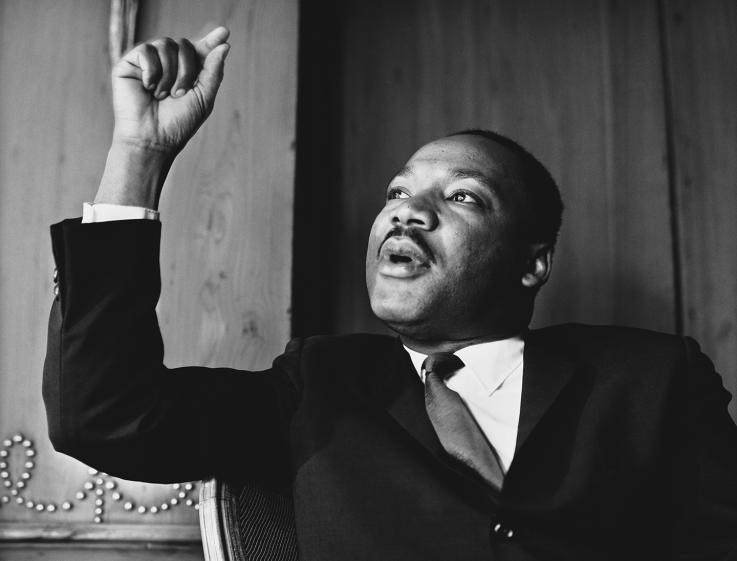Martin Luther King Jr. is my model for how to think about public anger. His issues as a custodian were quite different; they were about how to shape emotions within his own movement, as well as the general public. What he said is that anger has a protest part, where you say that terrible wrong has been done and we must not have that happen again. But it also has a retributive part, where the intention is to inflict pain on the people who gave us pain. He found that path useless because it’s not forward-looking or radical—it is just an easy way of acting out.
馬丁·路德·金是我思考公眾憤怒的榜樣。他作為管理者遇到的問題是完全不同的;這些問題是是關于如何在他自己的運動中塑造情感,以及如何在公眾中塑造情感。他說憤怒是抗議的一部分,而你們說已經犯下了可怕的錯誤且決不能讓這種事情再次發生。但它也有報應的部分,意圖是將痛苦強加給帶給我們痛苦的人。他發現這條路毫無用處,因為它既不具有前瞻性,也不激進——這只是一種簡單的行動方式。
He then said, “What do we do when we have these people who come with anger into the movement?” He said their anger has to be purified and channelized and linked with different emotions, such as hope, faith in the possibility of justice and, above all, love. You don’t even have to like these people, but you do have to have a basic goodwill toward their humanity and for their capacity for good action. You have to have the sense that it is always possible for people to listen and to change. Turning outward to the white body, he would say, “Well, you left us with a bad check that’s come back marked ‘insufficient funds,’ but you can always pay your debt.”
他還說,“當我們讓這些帶著憤怒的人加入這個運動時,我們該怎么辦?”他表示他們的憤怒必須得到凈化和渠道化,并與不同的情緒聯系起來,如希望、相信正義,最重要的是,愛。你甚至不需要喜歡這些人,但你必須對他們的人性和他們的善行能力有基本的善意。你必須意識到,人們總是有可能傾聽并作出改變的。他會轉向白人,說:“好吧,你給我們留下了一張空頭支票,上面寫著‘資金不足’,但你總能償還債務。”
That was a wonderful way of shaping public emotion in the most dangerous and difficult of American political situations. If he had not had that soaring and poetic rhetorical power, the whole country could well have burned down. It’s so important that he lived.
在美國最危險、最困難的政治形勢下,這是塑造公眾情緒的一種絕妙方式。如果他沒有那種氣勢磅礴、充滿詩意的修辭力量,整個國家很可能會被燒毀。重要的是他還活著。
You write about the importance of trust to a functioning democracy. Can you elaborate?
你寫到了信任對一個正常運轉的民主國家的重要性。你能詳細講講嗎?
If you are in an absolute monarchy, and the monarch is just extracting subservience and obedience, you may be able to rely on what the monarch will do. But reliance is different from trust.
如果你是在一個絕對的君主政體中,君主只是在榨取臣服和服從,那么你就可以依賴君主會做什么。但是信賴和信任是不同的。

Trust means something more; it means a willingness to be exposed and to allow your project and your future to lie in the hands of someone else. Think about a bad marriage. If somebody is ruling by fear, you might be able to rely on that person’s brutal behavior, but you wouldn’t trust that person.
信任意味著更多方面;意味著愿意被曝光,愿意讓你的項目和你的未來掌握在別人手中。想想一段糟糕的婚姻。如果一個人被恐懼統治,你可能會信賴那個人的野蠻行為,但你不會信任那個人。
A democracy depends on the idea that your hopes and future lie in the hands of people you don’t know. Bad decisions will be made, and your opinion won’t always win, but there is trust that the outcome—more often than not—will be one we can live with. And that requires a respect for the people on the other side, even when we think they are doing something wrong.
民主取決于這樣一種觀念:你的希望和未來掌握在你不認識的人手中。我們會做出錯誤的決定,而你的意見并不總是能贏得勝利,但我們相信,結果往往是我們可以接受的。這需要尊重另一邊的人,即使我們認為他們做錯了什么。
But it’s more than respect; trust involves allowing yourself to be vulnerable—to not sealing off the outcome and letting it sit there in the ballot box. It’s a big demand that requires a certain attitude towards the political process. I am very distressed at President Trump’s attacks on that process. We have lots of evidence that voter fraud is not an issue, but the constant harping on it is a very bad thing. The same goes for Trump’s attacks on the media. We need to believe that the news—at least a lot of it—is true, and we need to rely on that for the political process to work.
但這不僅僅是尊重;信任包括讓你自己變得脆弱——不封閉結果,讓它留在投票箱里。這個要求很大,需要對政治進程有一定的態度。我對特朗普總統對這一進程的攻擊感到非常痛心。我們有很多證據表明,選舉舞弊不是一個問題,但是不斷地重復這個問題是一件非常糟糕的事情。特朗普對媒體的攻擊也是如此。我們需要相信這些新聞——至少很多是真的——我們需要依靠這些新聞來推動政治進程。
譯文由可可原創,僅供學習交流使用,未經許可請勿轉載。












